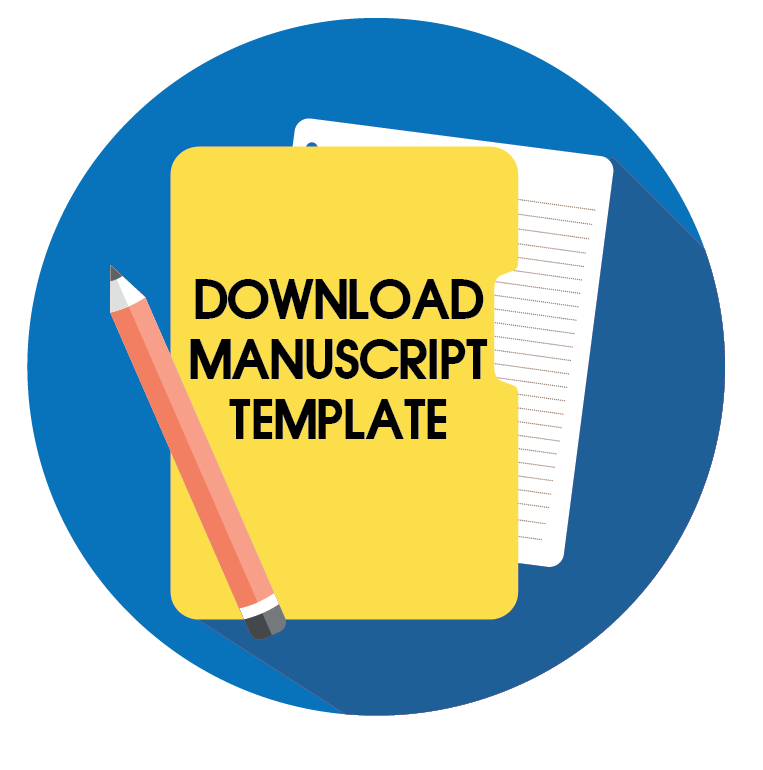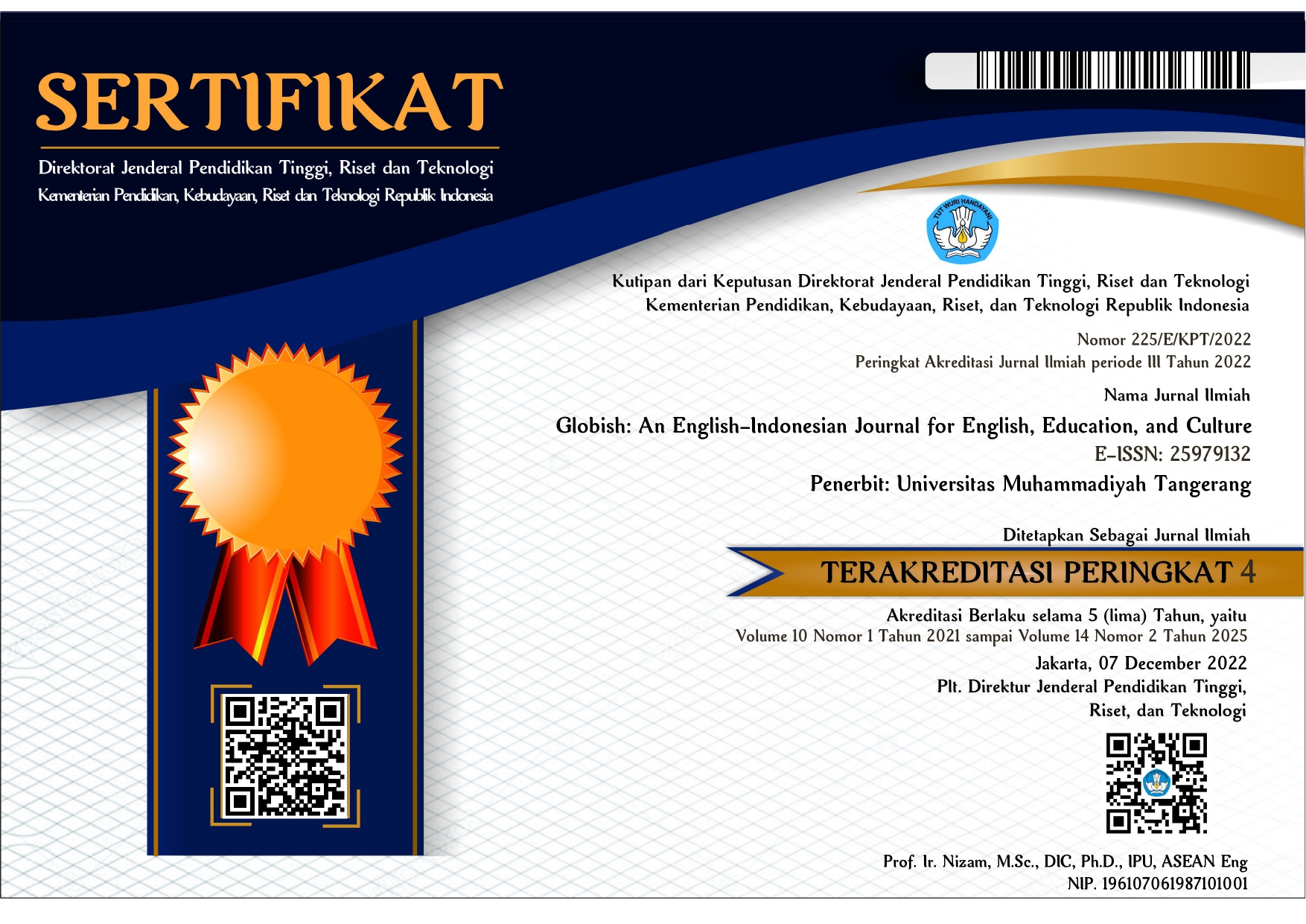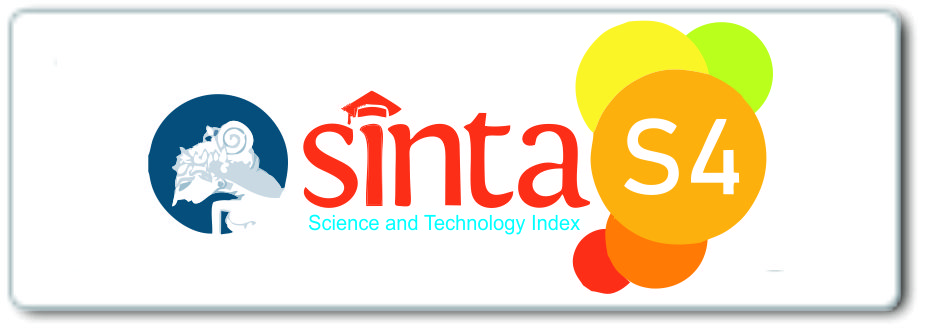THE CORRELATION BETWEEN STUDENTS’ SELF-EFFICACY AND THEIR SPEAKING ABILITY
Abstract
This study aimed to investigate whether there is correlation between students’ self-efficacy and their speaking ability. A quantitative correlational research was employed in the present study. The sample of the current research was 60 students of 8th grade of SMP Bilingual Terpadu, one of bilingual junior high school in Sidoarjo. A questionnaire of self-efficacy in speaking was distributed to obtain students’ self-efficacy score. To acquire students’ speaking skill score, a speaking rubric was utilized. Pearson Product Moment Analysis was run to analyze the correlation between students’ self-efficacy and their speaking ability. The P value was less than 0.05 indicates there is significance correlation between both variables. Moreover, the correlation coefficient, r = 0.667, indicates a moderate degree of correlation.
Keywords
Full Text:
PDFReferences
Ariyanti. (2016). Psychological Factors Affecting EFL Students’ Speaking Performance. ASIAN TEFL Journal of Language Teaching and Applied Linguistics, 1(1), 77–88. https://doi.org/10.21462/asiantefl.v1i1.14
Asakereh, A., & Dehghannezhad, M. (2015). Student satisfaction with EFL speaking classes: Relating speaking self-efficacy and skills achievement. Issues in Educational Research, 25(4), 345–363.
Azwar, S. (2012). Penyusunan Skala Psikologi edisi 2. Yogyakarta: Pustaka Pelajar
Bailey, K., Nunan, D., & Editor, S. (2005). Speaking. New York: McGraw-Hill ESL/ELT.
Bandura, A. (1997). Self- Efficacy: The Exercise of Control. In New York: W. H.Freeman and Company. https://doi.org/10.14710/empati.2018.21869
Bandura, A. (1999). Self-efficacy: Toward a unifying theory of behavioral change. In Roy F. Baumeister’s (Ed.) The self in social psychology (pp. 285-298). New York, NY: Psychology Press.
Brown, H. D. (2001). Teaching by Principles An Interactive Approach to Language Pedagogy (Second).
Brown, H. D. (2004). Language Testing Book: Principles and Classroom Practice. Book, 314.
Brown, H. D. (2006). Principle of Language Learning and Teaching (5th ed). United State of America: Pearson Education
Cladonia, Z., & Marlina, L. (2021). EFL Students’ Speech Self–Efficacy at English Department of Universitas Negeri Padang. Journal of English Language Teaching, 10(1), 36-44.
Desmaliza, & Septiani, T. (2017). Student ’ s Self - Efficacy And Their Speaking Skill At Lower Secondary School. 115(Icems 2017).
Fraenkel, & Wallen. (2009). How to Design and Evaluate Research in Education. https://www.ptonline.com/articles/how-to-get-better-mfi-results
Garson, G. D. (2012). Testing Statistical Assumptions. Statistical Associates Publishing.
Haidara, Y. (2016). Psychological Factor Affecting English Speaking Performance for the English Learners in Indonesia. Universal Journal of Educational Research, 4(7), 1501–1505. https://doi.org/10.13189/ujer.2016.040701
Harris, D. P. (1969). Testing English as a second language. New York: McGraw-Hill.
Hinkle, D. E., Wiersma, W., & Jurs, S. G. (1988). Applied statistics for the behavioral sciences. 2nd ed. Boston, Houghton Mifflin.
Hornby, A.S. (1995). Oxford Advanced Learner’s Dictionary of Current Language. Oxford: Oxford University Press.
Johnson, R. B., & Larry Christenseen. (2014). EDUCATIONAL RESEARCH Quantitative, Qualitative, and Mixed Approaches (Fifth). SAGE. https://www.ptonline.com/articles/how-to-get-better-mfi-results.
Gay, L.R. & Diehl, P.L. (1992). Research Methods for Business and Management. New York: Macmillan.
Kurniawan, Ildi & Sabaruddin, Syafrizal & Jayanti, Fernandita. (2018). An Analysis of Students’ English Speaking Skill at Coastal Schools of Bengkulu City, Indonesia. Journal of English Language Studies. 3. 18. 10.30870/jels.v3i1.2212
Maddux, J. E. (Ed.). (1995). Self-Efficacy, Adaptation, and Adjustment. The Plenum Series in Social/Clinical Psychology. doi:10.1007/978-1-4419-6868-5
Maddux, J. E. (1999). Expectancies and the social-cognitive perspective: Basic principles, processes, and variables. In I. Kirsch (Ed.), How expectancies shape behavior (pp. 17–40). Washington, DC: American Psychological Association.
Maddux, J. E. (Ed.). (2012). Self-Efficacy: The Power of Believing You Can. The Handbook of Positive Psychology. doi: 10.1093/oxfordhb/9780195187243.013.0031
Mishra, P., Pandey, C. M., Singh, U., Gupta, A., Sahu, C., & Keshri, A. (2019). Descriptive Statistics and Normality Tests for Statistical Data. Annals of Cardiac Anaesthesia, 20(4), 456–458. https://doi.org/10.4103/aca.ACA_36_17
O’Malley, J. M., & Pierce, L. V. 1990. Authentic Assessment for English Language Learner: Practical Approach for Teacher. Massachusetts: Addison Wesley.
Pollard, L. (2008). LUCY POLLARD’S GUIDE TO TEACHING ENGLISH A book to help you through your first two years in teaching. https://doi.org/10.26719/2009.15.3.653
Usher, E. L., & Pajares, F. (2008). Sources of Self-Efficacy in school: Critical review of the literature and future directions. Review of Educational Research, 78(4), 751–796. https://doi.org/10.3102/0034654308321456
Wilde, N., Hsu, A. (2019) The influence of general self-efficacy on the interpretation of vicarious experience information within online learning. Int J Educ Technol High Educ 16, 26. https://doi.org/10.1186/s41239-019-0158-x
DOI: http://dx.doi.org/10.31000/globish.v12i2.9111
Article Metrics
Abstract - 1949 PDF - 1876Refbacks
- There are currently no refbacks.
Globish
Program Studi Pendidikan Bahasa Inggris
Fakultas Keguruan dan Ilmu Pendidikan
Universitas Muhammadiyah Tangerang
Jl. Perintis Kemerdekaan I/33, Cikokol
Kota Tangerang, Indonesia
e-mail: globish_journal@umt.ac.id
Globish (p-ISSN: 2301-9913 | e-ISSN: 2301-9913) is licensed under a Creative Commons Attribution-ShareAlike 4.0 International License.









